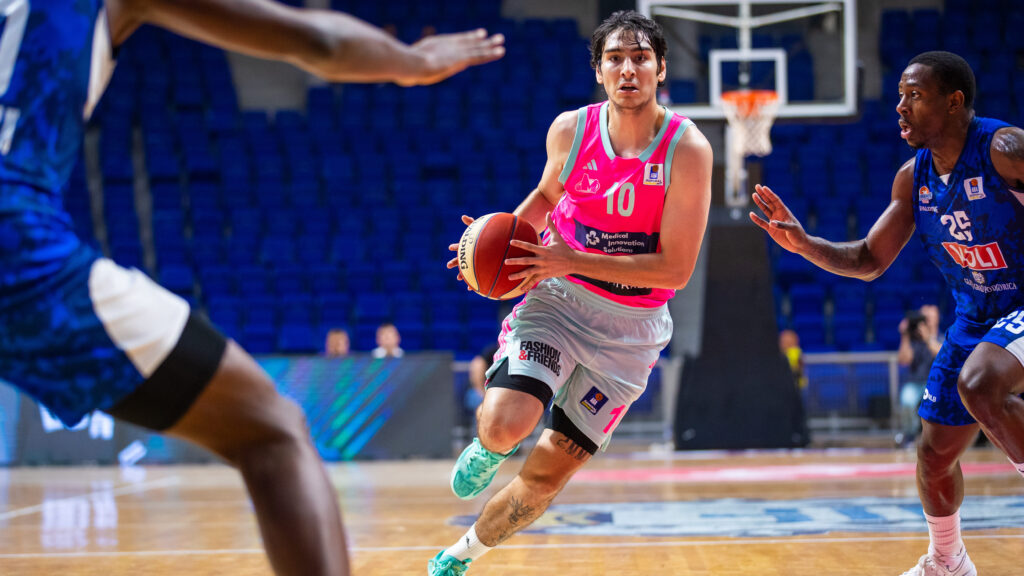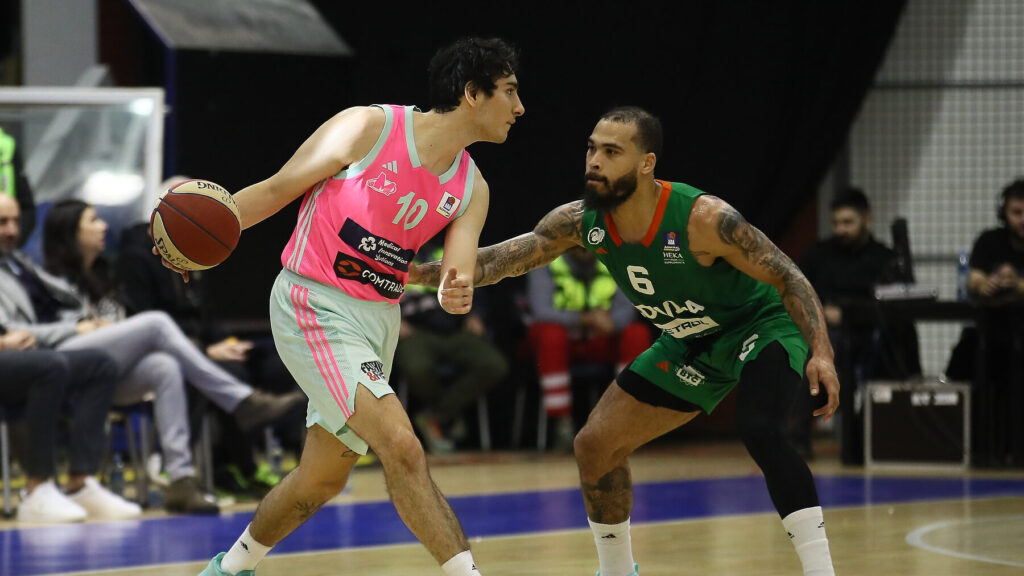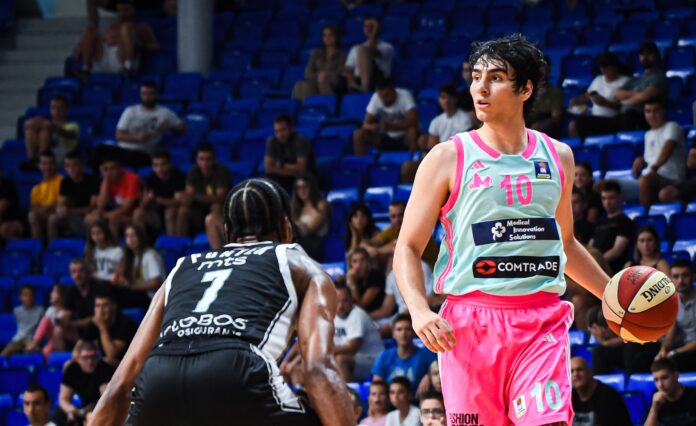Omercan Ilyasoglu, 23-year-old point guard of Turkish National Team, who plays for Mega MIS of the ABA League, made special statements to Basket Magazine. Our interview with Ilyasoglu, who answered the questions of our editor Ata Toprak Koşal, is as follows:
First of all, how’s the season going for you? Let’s start with that.
Overall, things are going really well for the team. Personally, this could be one of my best seasons at the Senior team level. Primarily because it’s the season where I’ve gotten the most playing time directly, averaging around 20-22 minutes per game. We have a good system, we play fast basketball. It’s a young team; in fact, our oldest player is the captain born in ’98, and I’m the next oldest. So, everyone is talented at a young age, playing good basketball. Our coach and staff are also very good. So, overall, I’m very satisfied. I’m glad I came here. Of course, there are challenges as well. When you first come to a foreign country, you struggle psychologically. My English isn’t top-notch, of course, but I’m trying to improve it here. There’s no problem with communication, but it’s not like a native language, of course. Apart from that, everyone here is warm. From the club staff to my teammates, including the coaches, everyone is supportive. Everything is positive, so ultimately, it’s a place I’m glad to be in.
Last week, you defeated Red Star. They’re a EuroLeague team, and you also beat Partizan in the first half of the league at home. You also had a good performance in that game. What can you say about that game?
Red Star had a double game week that week, and I believe they no longer have a chance in the EuroLeague, but they still played two games before we did. We generally play fast basketball, so we thought we could beat them by running them down. That was our plan; that’s how our system works. Of course, everyone is young, so it’s a situation that requires more experience towards the end, but generally, we managed the game very well, especially in the second half. They were actually playing with their full team; they didn’t have any absences. Here, unlike in Turkey, there’s no foreign player rule. Twelve foreign players can play. So, they had their main lineup. It was also significant for us in terms of making it to the playoffs.
You played against Milos Teodosic in that game. You know, one of the most important point guards in EuroLeague history. What can you say about him, or is he someone you look up to? What’s it like competing against him?
Milos Teodosic is one of the players I idolize in Europe. He’s a very talented player, highly skilled offensively; he can do everything. Anyone who knows him would attest to that. Playing on the same court as him is a great feeling. He may be nearing the end of his career now, but he can still showcase his basketball talent and provide a basketball spectacle. Getting such a significant victory against them is, of course, very important. I also have a photo with him during the game, which became a special memory for me. So, it’s a great feeling to be on the court with Teodosic.
You’re in a young team, and two weeks left in the regular season, you’ve secured a playoff spot. How do you view the playoffs now?
Well, of course, there’s a perception that young teams might be weak in terms of experience in the playoffs, and so on, but I believe that if we continue our basketball, we’ll pose a threat to everyone. It doesn’t matter who we face, but we might match up with Ljubljana in the first round. We managed to secure a good victory against them in the second game. It will be a tough game against them, of course. They are experienced and have a budget, but I believe having the home advantage will be in our favor. We’ll take it step by step—first, we’ll win the next two games and then prepare for the playoffs.
Can you compare the Turkish League and the ABA League a bit? What do you think is the difference between them?
Turkish League is one of the best leagues in Europe in terms of quality, especially along with Spain. In terms of player quality, the ABA League might seem a bit lower than the Turkish League, but the level of competitiveness here is very high.
Mega is already a great place; it has been one of the teams that has produced the most players in Europe for years. It’s also one of the teams that sends the most players to the NBA in Europe. In the ABA League, there are teams from the EuroLeague and the EuroCup, but it might be a bit lower in comparison to Turkey, but I think it has developed a lot in terms of basketball toughness. I believe this shows how much importance teams give to their own basketball and players. Moreover, everyone can beat everyone here. For example, today Krka defeated Ljubljana. Krka had beaten us before, but I believe they’re at the bottom now. Zadar can beat Partizan. We can beat Partizan and Red Star. So, I would say it’s a competitive league.

Can you tell us about your move to Mega, and the transfer process this summer?
Two or three years ago, I had a conversation with Misko when I was playing for Efes. At that time, I had a 5-year contract with Efes after coming up through the youth ranks and signing. I had played on loan in Bursa for a year. It wasn’t clear what I would do the following year. At that time, there was a possibility of joining Mega, but back then, Coach Ergin [Ataman], the head coach of Efes, wanted me to stay at Efes. And I had to stay because I had a contract with Efes. Then, last season was my final season at Efes, and halfway through the season, I transferred to Beşiktaş. I completed the season there. Towards the end of the season, Misko wanted to talk to me, so he came to Istanbul. He came with such an offer, asking, “Would you consider Mega? What do you think?” I looked positively upon it because I knew about Mega from before. Many players, from Vasilije Micic to Nikola Jokic, have spent a season at Mega, and I also played with Filip Petrusev at Efes. I always had good impressions of Mega. I was following them regularly, not regularly watching their games, but I had an idea about Mega. I knew that the ABA League is a competitive league. Misko convinced me that it would be a season where I could be in the main rotation for the first time. He presented me with such an opportunity, and I accepted it without hesitation.
How is the club’s approach to you? How does the club manage this project? Could you tell us a bit about it?
First of all, they have a very professional facility, from their employees to their coaches – I played at Efes as well, one of the best organizations in Europe – Mega also has all sorts of facilities. Training courts, weight rooms, physiotherapists… You do a lot of individual training here. For young players, this is a very good thing. We train together at least 3 times a week, for 2 hours each time. So, even though it may seem like a club focused on developing players rather than winning matches, we are winning matches this season as well. I can say both aspects are going well.
Everyone wants to win matches, of course, but here the main priority is to elevate the players to a better level. NBA, EuroLeague, even reaching everyone’s potential, that’s what it’s about. That’s why they always continue with young players. Everyone works very professionally.
Was there anything in Serbia that surprised or puzzled you?
In Serbia, in our team now, there are players from Croatia, Slovenia, Ukraine, so there are “international” players, and everyone has very high aspirations. For example, it wasn’t like this in Turkey. When you enter the club, they’ve made a panel at the entrance. They have lists of players who have been drafted or selected in the draft. Lists of players playing in the NBA are on the walls and so on. They encourage everyone to reach the top level. That’s everyone’s dream here. I haven’t heard of anything lower than the NBA or EuroLeague. I think that’s a very good thing. Having a dream is important for everyone. Some succeed, some don’t. Of course, not everyone will play at the highest level, but I think it’s important to have dreams like this and it’s important to be able to inspire these dreams. Because it’s not just a dream, they see it happening. Many people have gone from here to the NBA before them. For example, Nikola Topic, I hope he goes this year. Djurisic too, I hope he goes. That’s how I see it.
When I interviewed the coach, I asked about you, of course, he talked about your talent, but also about your good relationship with everyone off the court and your ability to adapt well. Could we see the influence of the Efes youth system in your ability to adapt?
Of course, yes. Efes was a very big club. You can’t see any bad intentions in anyone; everyone is well-intentioned. From players to staff, from the kit man to the physiotherapist, everyone was very warm to me from the beginning. They must have known it was my first year abroad. They helped me a lot to adapt here. When I first came, I had a hard time in training because I wasn’t used to this training pace. The coach called me, took me to dinner, we talked about his expectations of me, what I could do, or the weaknesses I needed to improve, and that’s very important. Having the coach expect something from you or articulate what he wants from you is very important. We also have one-on-one conversations before matches. I think it’s very important for him to talk to you directly; it makes you feel good and shows that he has confidence in you.
I’m the only one on the team who doesn’t speak Serbian. There are players from Croatia, Ukraine, Slovakia, but they all speak Serbian because they’ve been here since they were in the youth academy. Sometimes the coach speaks English, sometimes Serbian. When he speaks Serbian, the assistant coaches come running to me to translate, so I never felt excluded or anything like that.
When we came to Belgrade, we had the opportunity to observe the basketball culture over there. What can you say about the basketball culture in Belgrade?
I can say that everyone here loves basketball. Football might be the number one sport, but everyone looks very positively at basketball. Everyone from taxi drivers to regular people outside is familiar with basketball. They know about Mega. Of course, Partizan, Red Star are on a different level for them, but everyone follows basketball. For example, when you go to a café, matches are always on TV. It’s a very nice thing. Everyone here is very tall, probably because of their genetics. It doesn’t matter if they are male or female, they are all very tall. They have a lot of knowledge about sports. As you said, especially in matches like the Partizan-Red Star match, the atmosphere is huge. A lot of people go to the matches. Almost 23,000 people came to our second Partizan match. That day was special for us, of course. We received the news of Dejan Milojevic’s passing.
Basketball-loving fans also come to our matches. Our matches are already free, to promote basketball.
We are getting close to the end. You mentioned a bit about the playing system at Mega, there is a fast-paced transaction-based game. Can you tell us about the coach’s system? How does the coach approach basketball technically?
First of all, we prepare very well for the matches. We have a good amount of time to prepare. From the scouting of the assistant coaches to working on the opponent’s sets during training… We try to come to the matches as prepared as possible. I also think that during the matches, he analyzes the players psychologically very well. He also manages the rotation well. Being a coach in such teams – of course, it’s not my place to say – I think it’s even harder. Because it’s a place for developing players but at the same time, they expect you to win matches. It’s extra challenging to do both. And he’s also very young.
He turned 35 last week…
Yes, but in terms of experience, it’s not like he’s 35. I think he tries to communicate with all the players. We record the training sessions with a camera and look at our shortcomings in training. Of course, we have a lot of training sessions. Social life is also very restricted, but I came here with that in mind. We started the season very early, around July, or the end of June. Because we first played against USC in Mykonos. So, we gathered early. Since then, with the double training sessions, you also get psychologically exhausted. I didn’t have the chance to go to Istanbul. I came once for the national team. Other than that, I haven’t had the chance to come to Turkey during the season, but when you look at the results, it’s worth it. Overall, I’m happy, but it’s tiring.

What is your dream for the future? What are you aiming for?
Everyone’s dream is to be a top-level basketball player. My dream is also to play at the EuroLeague level, of course, but the NBA is a different level. No one says they won’t play in the NBA. But I prefer EuroLeague basketball more. I don’t watch the NBA much. I follow it for Alperen. I mostly watch for Alperen. Onuralp also left. I watch Turkish players, I should say. But I really enjoy watching EuroLeague matches, and I’m someone who watches a lot of matches. I follow it a lot. I also follow EuroCup, Champions League, and so on, but my goal is to play in the EuroLeague. Of course, in a good team. Speaking of teams, since I was a child, my dream has been Barcelona.
Finally… Do you have an idol?
From Europe… I mentioned Milos Teodosic. Also, from those who are currently playing, I would say Shane Larkin. Character-wise, basketball-wise… He’s an incredible person overall. Not because our playing styles are very similar, but I want to be a respected figure like him. A true leader in the team, a very good person.
In the NBA, there are also old players – I can mention Jason “White Chocolate Williams. And also Rajon Rondo…




